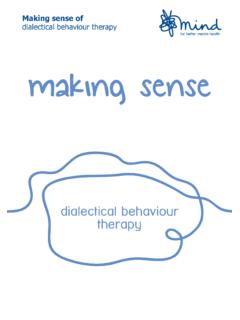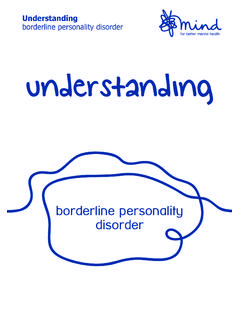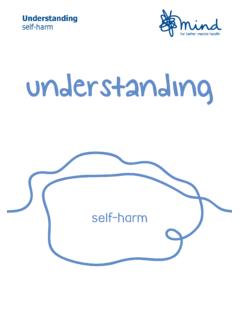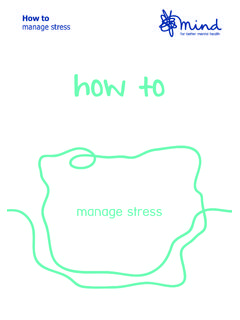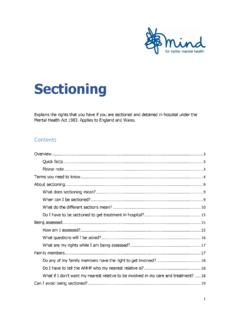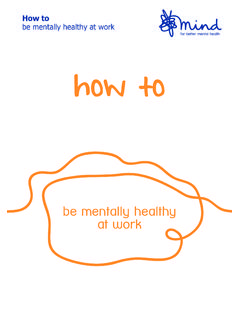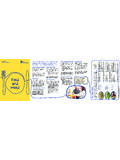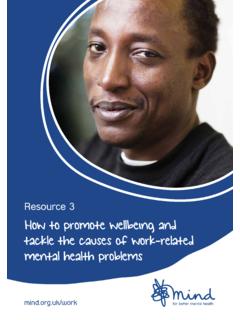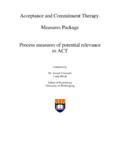Transcription of Making sense of dialectical behaviour therapy …
1 1 Making sense ofdialectical behaviour therapymaking sensedialectical behaviour therapy Making sense of dialectical behaviour therapyThis booklet is for anyone who is considering dialectical behaviour therapy (DBT), and would like to learn more about it. It explains what DBT is and who might benefit from is dialectical behaviour therapy (DBT)? 4 How does DBT work? 4 What is the treatment like? 6 Who can benefit from DBT? 9 How can I access DBT? 11 Useful contacts 134 Making sense of dialectical behaviour therapyWhat is dialectical behaviour therapy (DBT)? dialectical behaviour therapy (DBT) is a type of talking therapy which was originally developed by an American psychologist named Marsha Linehan.
2 It is based on cognitive behaviour therapy (CBT), but has been adapted to meet the particular needs of people who experience emotions very intensely. It is mainly used to treat problems associated with borderline personality disorder (BPD), such as: repeated self-harming attempting suicide using alcohol or drugs to control emotions eating problems, such as binge eating and purging unstable relationships. What is the difference between DBT and CBT? CBT focuses on helping you to change unhelpful ways of thinking and behaving (see Mind s booklet Making sense of cognitive behaviour therapy for more information). DBT also helps you to change unhelpful behaviours , but it differs from CBT in that it also focuses on accepting who you are at the same time.
3 DBT places particular importance on the relationship between you and your therapist, and this relationship is used to actively motivate you to can find out more about the development of DBT on the official DBT website, Behavioral Tech (see Useful contacts on ).How does DBT work?The goal of DBT is to help you learn to manage your difficult emotions by letting yourself experience, recognise and accept them. Then as you learn to accept and regulate your emotions, you also become more able to change your harmful behaviour . To help you achieve this, DBT therapists use a balance of acceptance and change does DBT work?What does dialectics mean?In a nutshell, dialectics means trying to balance seemingly contradictory positions.
4 For example, in DBT you will work with your therapist to find a good balance between: Acceptance accepting yourself as you are. Change Making positive changes in your life. You might eventually come to feel that these goals are not as conflicting as they seem at first. For example, coming to understand and accept yourself, your experiences and your emotions, can then help you learn to deal with your feelings in a different techniquesAcceptance techniques focus on understanding yourself as a person, and Making sense of why you might do things like self-harm or abuse drugs. A DBT therapist might suggest that this behaviour may have been the only way you have learned to deal with the intense emotions you feel so even though it s damaging to you in the long-term, and might be very alarming to other people, your behaviour actually makes someone is saying 'yes, it makes sense ' rather than 'no, that's wrong.
5 Change techniquesDBT therapists use change techniques to encourage you to change your behaviour and learn more effective ways of dealing with your distress. They encourage you to replace behaviours that are harmful to you with behaviours that can help you move forward with your life. For example, you might learn how to distract yourself from difficult emotions during crises by engaging in activities instead of self-harming. You can also start challenging your unhelpful thoughts and develop a more balanced way of looking at sense of dialectical behaviour therapyWhat is the treatment like?Standard DBT has four elements: individual therapy skills training in groups telephone crisis coaching with a therapist a therapists consultation course of DBT is usually offered for about one year, although this may vary across different therapyTheoretically there are four stages of individual therapy , but usually when people talk about DBT they just mean stage 1, which is about helping you gain control over your behaviour .
6 This is the most commonly available stage of DBT, and the only one that has been evaluated in research. DBT stage 1 has three main treatment goals: To keep you alive and safe by stopping suicidal and self-harming behaviours . To reduce behaviours that interfere with therapy by addressing issues that might come in the way of you getting treatment. To improve your quality of life by addressing anything that interferes with this, such as other mental health problems like depression or hearing voices, traumatic experiences, employment or relationship one-to-one sessionsIndividual therapy involves one-to-one weekly sessions with a DBT therapist.
7 Each session should last about 50 60 minutes. 76 What is the treatment like?At the beginning of the course of treatment, you and your therapist set some goals these always include the three stage 1 goals, as well as any specific changes that you want to make in your life. Over time you work together to solve problems that get in the way of these goals, such as self-harming, alcohol and substance misuse, or not attending therapists usually ask you to complete diary cards in your everyday life to monitor your emotions and actions. You then use this information to decide together what you will work on in each session. Skills training in groups DBT therapists offer skills training to a group of people at once.
8 This is not group therapy , but more like a series of teaching are typically four skills modules: 1. Distress tolerance teaching you how you can deal with crises in a more effective way, without having to resort to self-harming or other problematic behaviours . 2. Interpersonal effectiveness teaching you how to ask for things and say no to other people, while maintaining your self-respect and important relationships. 3. Emotion regulation a set of skills you can use to understand, be more aware and have more control over your emotions. 4. Mindfulness a set of skills that help you focus your attention and live your life in the present, rather than being distracted by worries about the past or the set of skills had a different benefit for me, for example the interpersonal effectiveness module helped me to repair my relationship with my mother, something neither of us thought would be sense of dialectical behaviour therapyThere are usually two therapists in a group and the sessions tend to last for about two hours.
9 You are also given homework each week to help you practise these skills in your day-to-day life. By completing the homework weekly, you might find that these skills gradually become second nature and you become better at dealing with difficult repetition of the modules in the skills training sessions meant that even though I was fighting it and sometimes wanted to self-harm, I was constantly being reminded of alternative ways to deal with difficult situations. Telephone crisis coachingDBT sometimes uses crisis coaching to support you to learn how to use your skills in real-life situations. This means that you can telephone your therapist outside of therapy sessions in the following situations: When you need help to deal with an immediate crisis (such as feeling suicidal or the urge to self-harm).
10 When you are trying to use DBT skills but want advice on how to do it. When you want to repair your relationship with your therapist. Therapists consultation groupsDBT therapists usually work in teams, rather than independently, because working with people with suicidal feelings and self-harming behaviours can be stressful. A group of therapists might have a weekly session with each other where they can discuss any issues that come up in treatment sessions. This is a way for them to express their feelings and concerns, and to ask for advice and different ideas that may help them to treat their clients more effectively. So in a sense you re actually getting the benefit of a team of therapists, rather than just one can benefit from DBT?


